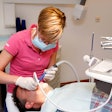
Providing patients with more information leads to better dental health, right? Not exactly. A new study found that giving pregnant women basic oral health information health was effective at improving their hygiene, but the addition of other interventions produced no further benefits.
Since pregnancy is believed to be a key time to deliver oral health information, researchers examined the effects of giving pregnant women a basic pamphlet on oral hygiene, as well as providing them with additional dental health information specific to pregnancy and guidance on developing a plan for better hygiene. They published their findings in Community Dentistry and Oral Epidemiology (June 14, 2017).
"Providing a simple oral health leaflet and simple dental hygiene demonstration on a plastic mouth model might influence the oral health behaviors among a population with low levels of oral health knowledge," lead study author Suad Al Khamis, PhD, told DrBicuspid.com.
Al Khamis is an assistant professor in the oral and dental health department of the College of Health Sciences at the Public Authority for Applied Education and Training in Shuwaikh, Kuwait. This research was part of her thesis for her doctorate in dental public health from King's College London. Her co-authors are affiliated with King's College London and the division of child and public dental health at Trinity College Dublin in Ireland.
Simple yet effective
A previous study by these researchers found that pregnant women in Kuwait held inaccurate beliefs and unhelpful attitudes about oral health behaviors. Many of them were unaware of gingivitis and periodontal disease, and they stopped cleaning their teeth during the first trimester of pregnancy because of bleeding gums or pregnancy sickness.
Research has suggested that knowledge is necessary for behavior change, but it may not be sufficient on its own. The current study focused on social cognitions that the authors' previous study had shown were important in influencing the oral health behavior of this population. This includes knowledge, attitudes, subjective norms, and barriers to oral health behaviors.
The researchers also wanted to explore the efficacy of implementation intentions, since previous research has shown that this can increase the likelihood of adherence to oral hygiene activities, such as regular toothbrushing and flossing. Therefore, they conducted a three-arm, randomized control trial of pregnant women in Kuwait to assess the effects of providing dental health education that was sensitive to the social and cultural context of the participants and also underpinned by psychological models of behavior change.
They recruited women who received care at three governmental outpatient maternity clinics in Kuwait. At baseline, all study participants were asked to complete a self-administered questionnaire. Next, they underwent plaque and gingival index assessments by a dental hygienist. Then, a researcher randomly assigned them to one of three groups: treatment as usual, dental health education, or dental health education and planning.
| Treatment received by group | ||
| Treatment as usual | Dental health education | Dental health education & planning |
| Standard dental hygiene information pamphlet, explanation of pamphlet information from researcher, and brushing and flossing demonstration on plastic mouth model. Given a toothbrush, fluoridated toothpaste, and dental floss | Standard dental hygiene information pamphlet, explanation of pamphlet information from researcher, and brushing and flossing demonstration on plastic mouth model. Given a toothbrush, fluoridated toothpaste, and dental floss | Standard dental hygiene information pamphlet, explanation of pamphlet information from researcher, and brushing and flossing demonstration on plastic mouth model. Given a toothbrush, fluoridated toothpaste, and dental floss |
| Dental health education booklet designed to be culturally appropriate for pregnant women informed by the previous study | Dental health education pamphlet designed to be culturally appropriate for pregnant women informed by the previous study | |
| Asked to write a plan of when, where, and how they would brush and floss their teeth, the obstacles that would stop them from doing so, and how they would overcome these obstacles | ||
The dental health education booklet targeted social cognitions and constructs, including knowledge, attitudes, subjective norms, barriers, and intention. It provided basic dental health information in general and related to pregnancy, such as about gum health during pregnancy and when to brush teeth after vomiting. Participants given the booklet were asked to read it before leaving the research intervention space and encouraged to ask questions about its content.
All study participants returned to the clinic for follow-up four weeks later. They completed the questionnaire a second time and were reassessed for the gingival and plaque indexes. These indexes were modified in this study to exclude probing due to Kuwaiti ethics committee requirements that prohibit invasive procedures being performed on pregnant women.
Of 154 women randomized into one of the three groups and who completed the baseline requirements, 90 (58%) completed the study: 28 of 53 (53%) in the treatment as usual group, 30 of 53 (57%) in the dental health education group, and 32 of 48 (67%) in the dental health education and planning group.
“The findings of this study suggest that even simple health education when knowledge levels are low ... might influence oral health behavior for pregnant women.”
Among all three groups at baseline, 38% reported brushing twice daily and 61% never flossed. Attitudes about oral health were unfavorable. Dental knowledge levels were low, with mean scores showing that the participants answered fewer than half of the questionnaire questions correctly at baseline.
At follow-up, the plaque and gingival indexes had improved significantly across the groups by 42% and 30%, respectively, which suggested more effective and sustained plaque control over the four-week period, according to the authors. However, the researchers found no benefits attributable to the type of intervention received. The participants also reported more frequent toothbrushing and flossing, but this was not different among the treatment groups.
Social cognitions, aside from the perception of barriers to dental attendance, significantly improved across the groups, but the researchers found no differences in changes among the groups. The women in all groups were more knowledgeable about oral health and had more positive attitudes about it, more positive social norms, and fewer perceived barriers to undertaking oral health behaviors.
Beyond treatment as usual, however, no benefit was attributed to the type of intervention received, the authors noted.
"Providing basic oral hygiene information with a brief discussion and demonstration of oral hygiene skills, as occurred in the treatment as usual group, was sufficient to support improvement in dental health behaviors for participants who had very low levels of oral health knowledge at baseline," they wrote.
New paradigm needed
The authors noted that the attrition rate in the study, while high, was in line with other similar studies. While demographics appeared similar between those who completed the study and those who didn't, the participants may not have liked the booklet or found it too long, were too busy to take time at their maternity visit to discuss oral health, or found the plaque and gingival scoring too invasive.
At the same time, the women in the group that included planning had the highest study completion rate, which might indicate greater engagement. The authors noted that the intervention was delivered by female dental hygienists whom the participants didn't know, so using local dental healthcare professionals with whom the women were familiar could increase engagement.
The study is one of the few to have been conducted in pregnant women in a Middle Eastern country. The social cognition model used in the study was developed in Western countries and may not apply to other cultures, the authors noted.
Al Khamis said she was surprised about the low level of oral health knowledge among the study subjects. She plans to conduct a similar study of pregnant women who don't use government clinics and study the perceptions, attitudes, knowledge, and practices of dentists regarding dental care for pregnant women.
"The findings of this study suggest that even simple health education when knowledge levels are low, which increases knowledge, might influence oral health behavior for pregnant women," she told DrBicuspid.com.



















